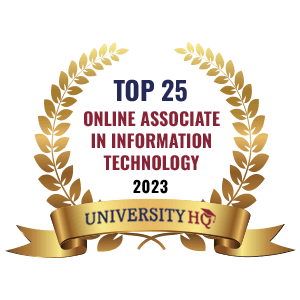What is Information Technology (IT)?
Montana may be best known for its natural beauty and outdoor recreation opportunities, but the state also boasts a growing information technology industry. From startups and remote work opportunities to strong university systems - Montana is a great place for IT professionals across many fields of practice.
Information technology professionals are specialists in computing and information technology, possessing in-depth knowledge of software and hardware systems as well as skills in designing, implementing, and maintaining these systems to ensure optimal functioning. Furthermore, these professionals also ensure data security is met by transmitting it securely and storing it properly.
CIT professionals' duties and responsibilities vary based on their specialty and employer but some common tasks include testing and evaluating computer systems, analyzing data to detect trends or patterns, providing technical support to users, creating documentation of computer systems, and suggesting hardware or software upgrades to increase system performance.
To be an effective CIT professional, you need a range of skills; technical skills, analytical skills, communication skills, and problem-solving abilities are essential to becoming successful in this profession. Technical abilities may include expertise in programming languages, operating systems, and software development, while analytical abilities help in diagnosing technical issues and communicating them to other departments and stakeholders to help find solutions tailored to meet those needs. Problem-solving abilities help identify issues with computer systems before any serious disaster strikes.

Featured Online Programs
Online Computer Information Technology (CIT) Education in Montana
Montana provides many educational and training options for individuals interested in computer information technology careers, from undergraduate and graduate degree programs in computer science and information systems at Montana State University to community colleges that offer training on these and related fields.
There are also a variety of job opportunities available for computer information technology professionals in Montana. Tech startups are popping up throughout the state, offering opportunities for software developers, web developers, and other IT professionals. In addition, many larger companies are expanding their operations in Montana, creating new jobs in the technology sector. Remote work is also becoming more common in the state, which means that professionals can work for companies located anywhere in the world while still enjoying Montana's quality of life.
Networking and professional development are important aspects of any career, and that's especially true in the rapidly changing field of computer information technology. Fortunately, Montana has a strong community of technology professionals who collaborate and share knowledge through meetups, conferences, and other events. There are also several professional organizations in the state, such as the Montana High Tech Business Alliance, that offer resources and support for professionals in the industry.
Online Associate (AS)

An associate degree in computer information technology is an academic program that provides students with a strong foundation in computer systems, programming, and networking. Graduates of these programs are equipped to work as IT professionals or can pursue further education to earn higher degrees.
Computer information technology colleges offer these degree programs with various specializations such as cyber security, database management, web development, and software engineering. Students gain practical experience through hands-on projects and internships that prepare them for real-world challenges. However, it’s important to note that some of these specialties, such as software development, may require that you earn more education to really make your way into the career.
In today's job market, the demand for skilled professionals in information technology is high. Graduates of an associate degree in computer information technology should have many career opportunities available to them including computer support specialist, network administrator or technician, web developer, database administrator or analyst, and cyber security specialist. The increasing reliance on technology across all industries globally has increased the demand for qualified professionals who can keep up with emerging trends and technologies; and graduates with these degrees can step into many roles in the field.
Online Bachelors (BS)

A bachelor's degree in computer information technology is designed for students who aspire to pursue a career in the growing field of information technology. Students will gain skills and knowledge in computer hardware, software, networking, cyber security, programming, database management, and project management. They will also learn to analyze complex problems and develop innovative solutions using technology.
Many colleges offer bachelor's degree programs in computer science or information technology. These programs are usually four years long and can be completed on-campus or online. Students may have the option to specialize in areas such as cyber security, software development, data analytics, or web design.
Graduates with a degree in this field can work as network administrators, system analysts, database administrators or developers, cyber security specialists, or web developers, among others. The demand for skilled IT professionals continues to grow making this degree a valuable investment for those interested in pursuing careers within the sector.
Find Your Online Information Technology Program
Online Masters (MS)

Earning a master's degree in computer information technology is an excellent way to take your skills and knowledge to the next level. These degree programs provide students with advanced training in computer systems, networks, software development, cyber security, data analytics, and more. A student can choose from various specializations they cannot access at lower degree levels such as artificial intelligence, data science, cyber security, and cloud computing.
The curriculum of a master's degree in IT or computer science includes theoretical concepts and practical applications that can be implemented in real-world scenarios. The courses are designed to equip students with advanced technical skills that are highly sought after by employers in the IT industry. Graduates of these programs have numerous career paths available to them including roles such as software developer, systems analysts or IT managers.
Overall, pursuing a master's degree in computer information technology is an excellent choice for individuals who want to enhance their skills and knowledge of technology while opening up new career opportunities. With everything from artificial intelligence systems development to cyber security being covered through these programs at colleges around the world, it’s never been easier for anyone seeking further education or advancement within one’s professional field.
Online Doctorate (PhD)
A PhD in computer information technology is the highest level of education one can attain in this field. This program is designed to train students to become experts in computer systems, software development, and data analysis. The coursework includes advanced topics such as algorithms, artificial intelligence, computer networks, information security, and database management. However, a large focus of PhD programs is often teaching and research, with the aim of preparing graduates to work in academia. A PhD isn’t necessary to work at nearly any level within an IT company or firm, though you could leverage your new expertise to set up your own company or work as a consultant.
The program usually takes between 4-6 years to complete and requires extensive research work towards a dissertation which contributes new knowledge and insights into the field. Graduates with a PhD in computer information technology are well equipped for various careers including academia, roles in research institutions, or industry positions that require high-level expertise.
Online Certifications
Computer information technology certifications are essential for professionals in the IT industry. These certifications demonstrate that individuals possess the necessary knowledge and skills to perform specific tasks related to computer hardware, software, networking, security, cloud computing, and other areas of IT.
There are numerous types of IT certifications available from different vendors such as Microsoft, Cisco, CompTIA, Amazon Web Services (AWS), Google Cloud Platform (GCP), Oracle Corporation, and many others. Each certification has its own requirements and objectives that must be met by candidates who want to earn it.
Having computer science or IT certifications not only enhances an individual's professional credibility, but it also increases their job prospects in the highly competitive tech industry. Employers often prefer certified professionals over non-certified ones because they know that certified professionals have demonstrated competence in specific areas of IT. Additionally, many organizations require their employees to hold certain certifications or offer increased compensation for holding them.
Become a Computer Information Technologist
Information technology (IT) is a rapidly growing field, and Montana is no exception. As technology continues to develop, companies are looking for skilled professionals to keep up with the latest trends and technologies. Here are some steps to help you become an IT professional.
-
Step 1: Obtain a Degree or Certification
Aspiring IT professionals must hold either a degree or certification to enter this industry. Common degrees include computer science, computer engineering, software engineering, and information technology - while certifications like CompTIA A+, Microsoft Certified Solutions Associate (MCSA), and Cisco Certified Network Associate (CCNA) can prove valuable in certain cases.
-
Step 2: Gain Work Experience
Once you have earned a degree or certification in computer information technology, gaining work experience is vital to becoming a computer professional. This may involve internships, entry-level positions, freelance work, or portfolio creation in any of these roles; many IT professionals begin in help desk roles providing technical support and troubleshooting to end-users.
-
Step 3: Develop Specializations
IT is a vast field with numerous specializations. Some examples are programming, network security, database administration, and web development, among many more. To truly differentiate yourself as an IT professional and become more valuable to potential employers, it’s vitally important that you develop specializations that help you to differentiate yourself.
Find Online Information Technology Programs
-
Step 4: Stay Current with Industry Trends
Staying abreast of developments within the technology sector is vital, but staying up to date with its latest trends and advancements may require the reading of industry publications, attending conferences and workshops, or participating in online forums - these are great ways of staying current on what's happening in your field.
-
Step 5: Network with Other IT Professionals
Networking is a critical aspect of any career, but particularly so in the technology sector. Connecting with fellow IT professionals can help you find new job opportunities, stay current on industry trends, and form long-term relationships that could prove invaluable later. Joining professional organizations, such as the Montana Tech Council, or attending technology-related events near your location are excellent ways to expand your professional circle and network effectively.
What Can I Do with a Bachelor's in Computer Information Technology?
With a bachelor's degree in computer information technology or computer science, graduates have a wide range of career options to choose from. One of the most popular paths is becoming a computer and information systems manager, where professionals oversee the technology needs of an organization and ensure that they align with overall business goals. This will likely require years of experience, and/or a master’s degree, because it’s a management position.
Another option is becoming a network or systems administrator, where individuals manage the day-to-day operations of an organization's computer networks and troubleshoot any issues that arise. Software developers are also in high demand for those with an IT degree, designing and creating software applications for various industries.
For those interested in cyber security, there are opportunities as information security analysts. These professionals work to protect an organization's computer networks from potential threats by implementing security measures and monitoring for any suspicious activity. With continued advancements in technology, the opportunities for those with a bachelor's in this field will only continue to grow.
Potential Careers for Computer Information Technology Graduates
- Special Effects Artists and Animators:
Special effects artists and animators specialize in producing visual effects and animations for film, TV shows, and video games using special software applications to bring characters, environments, and objects to life.
Necessary Requirements:
- Bachelor's degree in animation, computer graphics, or related field
- Strong proficiency in industry-standard software such as Maya, After Effects, and Photoshop
- Excellent communication skills and ability to work well in a team environment
- Demonstrated creativity and attention to detail
- Ability to manage multiple projects simultaneously and meet deadlines
Estimated Salary
- The median annual wage for special effects artists and animators in the US in 2021 was $78,790
- The mean annual wage for graphic designers in Montana is $47,870
- Data Scientist:
A data scientist will be responsible for analyzing complex data sets to unearth valuable insights and trends. They tend to work closely with cross-functional teams in creating predictive models and algorithms that enable users to recognize patterns, make informed decisions, and optimize business processes.
Necessary Requirements:
- Bachelor's or Master's degree in Computer Science, Statistics, Applied Mathematics, or related field
- Strong analytical skills with experience in statistical analysis, machine learning, and data visualization
- Proficiency in programming languages such as Python, R, or SQL
- Excellent communication skills with the ability to present complex data in a clear and concise manner
- Strong problem-solving skills with the ability to think creatively and independently
Estimated Salary
- The median annual wage for data scientists in the US in 2021 was $100,910
- The mean annual wage for data scientists in Montana is $74,720
- Web Developer:
Web developers are responsible for designing and creating websites and web apps using languages like HTML, CSS, and JavaScript to produce functional yet visually appealing sites.
Necessary Requirements:
- Strong knowledge of coding languages such as HTML, CSS, and JavaScript
- Familiarity with web development frameworks such as React or AngularJS
- Experience with database systems such as MySQL or MongoDB
- Understanding of server-side languages like PHP or Python
- Strong problem-solving skills and attention to detail
Estimated Salary
- The median annual wage for web developers and digital designers in the US in 2021 was $78,300
- The mean annual wage for web developers in Montana is $58,870
- Software Designers and Developers:
Software designers and developers will design, develop, and maintain software applications. Working closely with team members, you will interpret user requirements into functional solutions before employing your creativity, analytical abilities, and technical know-how to produce high-quality software that fulfills customer demands.
Necessary Requirements:
- Bachelor's degree in Computer Science or related field
- 2+ years of experience in software design and development
- Proficiency in programming languages such as Java, C++, Python, etc
- Strong analytical and problem-solving skills
- Excellent communication skills to collaborate effectively with cross-functional teams
Estimated Salary
- The median annual wage for software developers in the US in 2021 was $109,020
- No available mean annual wage for software developers in Montana, but software quality assurance analysts and testers earn $70,710.
- Network and Computer Systems Administrator:
A network and computer systems administrator will be accountable for overseeing the overall maintenance, configuration, and reliable operation of computer systems, network servers, and virtualization infrastructure.
Necessary Requirements:
- Bachelor's degree in Computer Science or a related field
- 3+ years of experience in network administration
- Strong knowledge of networking protocols (TCP/IP), hardware, and software
- Experience with virtualization technologies such as VMware or Hyper-V
- Knowledge of server operating systems such as Windows Server or Linux
- Knowledge of server operating systems such as Windows Server or Linux
Estimated Salary
- The median annual wage for network and computer systems administrators in the US in 2021 was $80,600
- The mean annual wage for network and computer systems administrators in Montana is $79,780
- Database Administrator:
Database administrators must manage the performance, security, and availability of databases. They design, develop, and maintain their respective systems so that data is accessible while remaining safe. Their role often involves troubleshooting issues associated with the databases in question, as well as making sure backup copies can be restored should anything occur that compromises the system.
Necessary Requirements:
- Bachelor's degree in Computer Science or a related field
- Strong knowledge of SQL and database management systems such as MySQL, Oracle, or SQL Server
- Familiarity with cloud-based databases such as Amazon RDS or Microsoft Azure
- Experience in database design and development
- Strong analytical skills
- Ability to work well in a team environment
Estimated Salary
- The median annual wage for database administrators and architects in the US in 2021 was $101,000
- The mean annual wage for database administrators in Montana is $77,750
- Computer User Support Specialist:
A computer user support specialist provides technical support and assistance to computer users. They help troubleshoot problems and provide solutions to technical issues.
Necessary Requirements:
- A bachelor's degree in computer science or a related field
- Experience with computer hardware, software, and network systems
- Strong problem-solving skills
- Excellent communication skills both verbal and written
- Ability to work independently or as part of a team
Estimated Salary
- The median annual wage for computer support specialists in the US in 2021 was $57,910
- The mean annual wage for computer user support specialists in Montana is $49,030
- Cyber Security Analyst:
A cyber security analyst is responsible for ensuring the security of an organization's computer systems, networks, and data. They analyze security risks and develop strategies to protect against potential threats.
Necessary Requirements:
- Bachelor's degree in Computer Science, Information Technology, or a related field
- Strong understanding of networking protocols and technologies
- Experience with security tools such as firewalls, intrusion detection/prevention systems, and antivirus software
- Knowledge of regulatory compliance standards such as HIPAA, PCI DSS, and GDPR
- Excellent analytical and problem-solving skills
- Ability to work independently as well as part of a team
Estimated Salary
- The median annual wage for information security analysts in the US in 2021 was $102,600
- The mean annual wage for information security analysts in Montana is $90,100
Search All Programs
